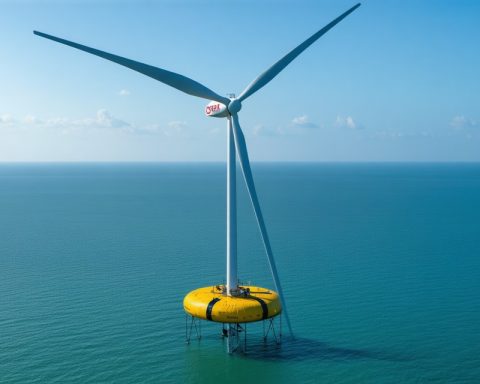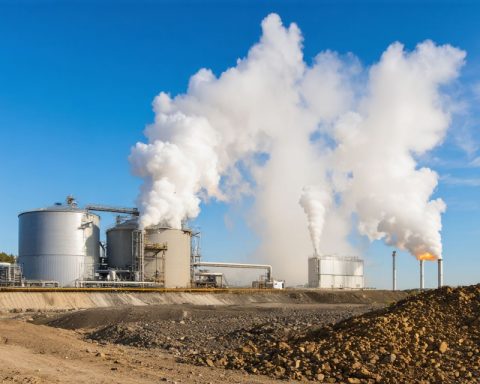In an unexpected turn of events, 80 Mile, a pioneering exploration and development company, has made a groundbreaking discovery at its Hammaslahti project in Finland. Unveiling the potential of this Nordic region, the company has detected noteworthy concentrations of natural hydrogen and helium in the area. Hydrogen levels were found reaching up to 1,000 parts per million, while helium showed impressive concentrations of as high as 8.90%, eventually stabilizing around 7.10%.
This discovery could signal a transformative shift in the energy sector. Eric Sondergaard, Managing Director at 80 Mile, expressed great enthusiasm about this finding, highlighting it as a pivotal milestone. The detection of these gases in such significant amounts not only points to the unexplored potential of the Hammaslahti region but might also position Finland as a key player in the future global energy market.
The implications of these findings are far-reaching. Natural hydrogen, considered a clean and efficient energy source, along with helium, crucial for technologies such as MRI machines and space exploration, may drive increased interest and investment in the region. This could accelerate the development of sustainable energy solutions in Finland and beyond.
80 Mile’s revelation is a beacon of innovation, reinforcing the idea that untapped natural resources can be the cornerstone of a greener and more sustainable future. Whether Finland rises to become a hub for these vital elements remains to be seen, but the foundations have undoubtedly been laid with this remarkable discovery.
Revolutionizing Energy: How Finland’s Natural Gas Finds Could Change the World
In the serene landscape of Finland, a groundbreaking discovery at the Hammaslahti project has the potential to rewrite the energy narrative globally. While many regions continue their reliance on traditional fossil fuels, Finland’s revelation of substantial natural hydrogen and helium reserves is poised to propel the country into the spotlight as a prospective leader in sustainable energy.
Understanding the Impact of Natural Hydrogen and Helium
The discovery by 80 Mile marks an extraordinary milestone with impactful consequences. Hydrogen, when burned, only produces water vapor as a byproduct, making it an ideal candidate for a sustainable and clean energy solution. However, one must delve deeper into how this affects the lives of people, communities, and even entire countries.
1. Lower Carbon Emissions: Harnessing these gases significantly reduces the carbon footprint compared to fossil fuels. This has a direct impact on mitigating climate change—a priority on the global agenda. Communities would witness cleaner air quality, which translates into improved public health.
2. Economic Prosperity for Finland: The potential for economic growth is tremendous. If Finland capitalizes on this treasure trove, it could see an influx of investments, job creation, and a boost to the local economy. This brings prosperity not only to urban areas but also to remote regions involved in exploration and development.
3. Energy Independence: For countries reliant on imported energy, Finland’s self-sustaining model could serve as an inspiration, paving the path for energy independence globally. This reduces geopolitical tensions over energy resources and fosters international stability.
Facing the Challenges Head-On
Despite the optimistic outlook, the extraction and utilization of natural hydrogen and helium are not without their challenges.
– Technological Advancements Needed: Current technologies may not be entirely efficient in processing and utilizing these gasses. There’s a pressing need for innovation in extraction and safety procedures, which could see a rise in research and development activities.
– Environmental Concerns: Although hydrogen is clean when used, its extraction process needs careful planning to ensure it doesn’t damage ecosystems. Comprehensive environmental assessments will ensure that this progression is genuinely sustainable.
Is Finland the Next Global Energy Titan?
The exciting developments at the Hammaslahti project evoke several questions: Will Finland seize this opportunity? How will countries dependent on fossil fuel exports react to this shift? Only time will tell if this Nordic nation harnesses its newfound potential to become a pioneering figure in the green energy revolution.
For those interested in sustainable energy developments, sites such as Energy.gov and International Energy Agency offer valuable insights into ongoing global trends and technologies.
As the world watches Finland’s next moves, it becomes clear that the Hammaslahti project could set a precedent, possibly reshaping not only the energy landscape of Finland but potentially influencing the choices of countries worldwide towards a cleaner, greener future.














